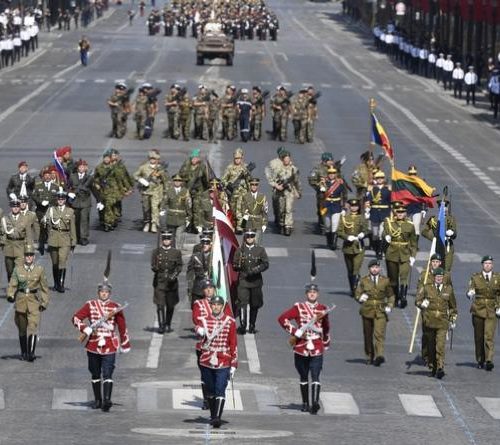THE PARADE OF JULY 14, 2022 IN PARIS WAS PLACED UNDER THE SIGN OF “EUROPEAN UNITY AND NATO SOLIDARITY”.
What European unity is this? What solidarity is there in the military alliance represented by NATO?
The war in Ukraine has profoundly changed the geopolitical context and the perception of all capitalist countries. These cannot bear that a country like Russia should dare confront NATO.
The Russian intervention in Ukraine would be for many, on the right as on the left, “an illegal war”. As if the other wars waged by imperialism in Yugoslavia, Afghanistan, Iraq, Syria, Libya and in many other countries could pass for legal!
The NATO summit which has just been held in Madrid on 29 June, succeeded in uniting all the countries of the European Union behind its New Strategic Concept and its 2030 objectives. Russia is labelled ‘a terrorist country’ for its initiative in stopping the advance of the Atlantic Alliance (NATO) eastwards against its sovereignty (Russia’s), and in outbidding the sixty or so sanctions against it, in a bid to isolate it by every means.
The summit’s final declaration says that “any aggression against NATO territory must be avoided”. NATO has its own “territory” then nowadays, that of all the so-called democratic countries that make up the Atlantic Alliance? But Ukraine is not a member of NATO, nor even of the European Union. So, how could the said Russian aggression against Ukraine be considered an aggression against all the NATO member countries, except if, of course, one was dealing here with the direct interests of US imperialism?
The United States have achieved their objectives in this conflict: mobilise the whole of the European Union and the NATO member countries in taking part in the sanctioning of Russia; get them buy energy from the USA like shale gas; each agreeing to up their military expenditure to 2% of GDP, each sending a large number of weapons to Ukraine. They even enlarge the Alliance, by bringing Finland and Sweden into it, so far neutral vis-à-vis NATO, with long borders with Russia. The aim is also to facilitate Ukraine’s entry into both the European Union and NATO. Ukraine is a country whose government is considered “one of the most corrupt in Europe” by the Ukrainian trade unionists who fight against the ultra-liberal reforms imposed by President Zelinsky. The latter takes advantage of the war situation to speed up the destruction of the Labour Code.
France and NATO
France is now one of the central players in NATO. It never really left NATO however, because under General de Gaulle, it was only the Nato’s Integrated Command that France was left out of. This had suited the interests of French imperialism in its own post-colonial wars in Africa. Relations between France and NATO have always been the subject of rivalry, with France always wanting a better place in the organization. This is how in 2019 Emmanuel Macron had said to the weekly The Economist that “What we are currently experiencing is the brain death of NATO”. He had criticized the lack of organization and cohesion inside the Alliance and raised the need for Europe’s strategic autonomy at military level.
France’s position within NATO today may look like a reversal. In reality it has only strengthened France’s positions in the organization since 2019. France then allowed the landing of US troops in the port of La Rochelle bound for Germany in July 2020. It has participated with its fleet – a nuclear-attack submarine included – in major NATO maneuvers in the South China Sea, and patronised the installation in France of several NATO military bases.
During this July 14, Emmanuel Macron showed the country, and also the world, the modernization and development of the equipment of its military forces mobilized on the Eastern flank of Europe, with 9 countries of the former Soviet Union rallied to the European Union and NATO: Bulgaria, Estonia, Lithuania, Latvia, Hungary, Poland, Czech Republic, Romania and Slovakia. The general public thus learned that 40,000 soldiers were present in these 9 countries to strengthen the Atlantic Alliance. It learnt that France was directly involved in the training of the troops of these countries, and with the aim to “consolidate and scale up the effort started in 2018 to produce stronger weapons capabilities, more massively so, and faster”.
It is therefore an escalation in the war that we are witnessing, not only in Europe but in the Asia-Pacific region. China is enemy number two declared by NATO, behind enemy number one which is Russia. In this context Emmanuel Macron can effectively announce that the war in Ukraine is likely to last a long time, particularly since NATO’s plans for 2030 – announced in its ‘new strategic concept’ – had already been drafted long ago, before Russia entered the war this February. These aims had already been invoked in 2014, following the result of the referendum in Crimea where the population had voted massively for its attachment to Russia.
The worsening of the capitalist crisis
The war in Ukraine is deepening the crisis of the capitalist system. The multitude of sanctions decided against Russia will above all harm the populations of the capitalist countries and strike back in the form of an economic, political and social boomerang. We can already see the consequences with the increase in the prices of cereals and raw materials, of energy, with the increase in the number of refugees that Europe must urgently take account of, at the expense of refugees from previous wars, creating even more inequalities and untenable situations.
The crisis of the capitalist system is at all levels: inability to resolve health issues and the pandemic, inability to reduce social inequalities, inability to respond to the challenges of global warming and the pressing needs to maintain and restore biodiversity. The consequences of the war in Ukraine only exacerbates a situation in which many European countries have become dependent on Russian energies. It is therefore above all at this level that the crisis is most acutely expressed. The rise in the price of raw materials and the decrease in the flow of gas and oil from Russia are causing large groups such as EDF in France or BASF in Germany to suffer a very significant financial collapse.
In France, there have been the shutdown of 19 nuclear reactors, the delays in decisions to build new EPR power plants (third generation pressurised water reactors), the cost overruns linked to the war in Ukraine, the takeovers of companies imposed by the government. This has meant that EDF (Electricite de France) has suffered huge financial losses, forecasting 65 billion euros in debt at the end of the year. With this critical situation since the beginning of July, there has been talk of nationalizing the company, in which the State would take over 100% of the shares, thus assuming the debts. According to Prime Minister Elisabeth Borne, this operation would represent “a full regaining of control of electricity production” and a “response to the climate emergency”. In opposition to this, the French trade unions denounce this operation in which the State, in taking control over the entire company, would have full latitude to dismantle the entire networks in electricity production and distribution.
Germany is in the process of enormously increasing its military and arms production capacities while taking a greater part in NATO activities. in recent years, it has become dependent on Russian gas. It maintains close ties with the Gazprom company in the field of the technological assistance provided for the construction of the Nord Stream pipelines passing through Ukraine and Belarus. This means that the Uniper group, the leading importer of Russian gas in Europe, has to face a financial ‘hit’ of around 900 million euros in losses per month. This remains however a drop in the bucket for this large group which makes colossal profits of several billions each year. This situation, described as an “energy war led by V. Putin”, imposes a reduction in production by BASF (huge multinational chemical conglomerate) and the implementation of an emergency plan by the government, including a bill on the reactivation of coal-fired power plants, as well as a rescue device through the nationalization of the company.
The capitalist crisis was also the centre of discussions at the Davos Economic Forum, which was held last May and brought together nearly 3,000 people linked to finance and the world economy. All the current issues were discussed: the two years of pandemic, the urgency to respond to global warming, the global recession and the war in Ukraine, all of which contributes to calling into question the major equilibriums. It is therefore the uncertainty of the future of the global financial elites that has been evoked, as well as their insecurity and fear of disappearing. All this pushed them to unite behind an ‘alliance of democrats’ against Russia and China, as well as to significantly increase military spending and achieve a global realignment with the United States. You only have to look at the purchases of F-35s, or of shale gas from several European countries, to be convinced of this.
We therefore arrive at this paradox where the joint resolve of the so-called developed countries is to further expand NATO, while it is this NATO enlargement that led to the war situation in Ukraine. It would be risky to think that NATO’s concerns for the fate of Ukraine and its population may cause it to seek a peace agreement with Russia. Rather, it seems that the conflict is likely to spread. Add to this that France and the NATO member states, have still not ratified the Treaty on the Prohibition of Nuclear Weapons (TIAN). France was conspicuously absent from the first meeting of the signatory States held in June, at the United Nations Office in Vienna, and where they reiterated their “commitment to a world free of nuclear weapons”.
Imperialism can only resolve its contradictions by means of wars. It will end up using atomic weapons despite the hesitations and the panic-fear of disappearing. The confrontation with the bloc of so-called socialist countries should have ended in 1991 with the disappearance of the USSR. Yet NATO, whose eastward expansion has seen the number of its members triple since its creation in 1949, is now dragging the countries of the European Union behind itself, always considering Russia, and now China, as the systemic enemies to be brought down. Before that, the NY 9/11 events had been used as pretext for the war on terrorism against the “axis of evil”, which had led to the wars against Afghanistan, Iraq, Libya, Syria…
The European Union and the arms race
For years, and in particular since the dissolution of the Warsaw Pact, the European Union has sought to create the conditions for a “Europe of Defence”. But this is just a decoy. Last March the EU, pushed by the war in Ukraine, invented the “strategic compass”, a concept that clearly shows the loss of bearings of the countries that make up the Union. In fact, the compass is that of the United States and of NATO, that they follow. The European Parliament has released specific funds of 7.9 billion euros to build a so-called European Defense Fund by 2027; and the EU has reportedly earmarked more than 450 million euros for the purchase of armaments to constitute a “European peace facility”! What confidence can we have in these institutions which only represent the interests of the European bourgeoisie and the large multinationals which carry out lobbying actions to impose their points of view?
In France, the 2019-2025 military programming law provides for a budget of 295 billion euros over 7 years for the renovation and modernization of the infrastructures and equipment of the armed forces, of which we had a glimpse during this parade on 14 July, after a steady decline and significant staff reductions. The 2% of GDP corresponding to the increase in armament expenditure imposed by NATO was approved by all members at the last summit, even those who had been reluctant to do so until then.
We should recall that last year there was a stir in the army and the intervention of high-ranking officers refusing that France and Europe be more and more subservient to the Atlantic Alliance. They had posed then that it was necessary to return to a national defence, to strengthen the military capacity of France and to break with NATO. What about these positions today when France is increasingly mobilized alongside the United States and appears to be a very engaged member vis-à-vis NATO, with an increased commitment to the arms race?
The present situation of war in Ukraine must be discussed in all the left political parties in France. Some of them call to send arms to Ukraine and support the European Union in its warmongering aims. This amounts to a call to support a failing and obsolete capitalist system. This fact lends more means and capacities to American imperialism and NATO to continue to play their role as policemen of the world.
Peace can only be imposed by the struggle against the capitalist system, a system where competition and profit are at the centre of all actions. In this context, the values of solidarity have nothing to do with NATO. This is only a military alliance with clearly defined objectives that go against the will of the peoples to live better, in peace and security.
We must therefore fight in the first place for France to leave NATO. This is the only possible condition to be able to build a society in which the aspirations of all are taken into account and where a program of social transformations is really implemented.
The Posadists – July 20, 2022
Photo: July 14 parade in Paris, foreign troops in the spotlight













